Unit 4 第欧根尼与亚历山大
DiogenesandAlexander翻译
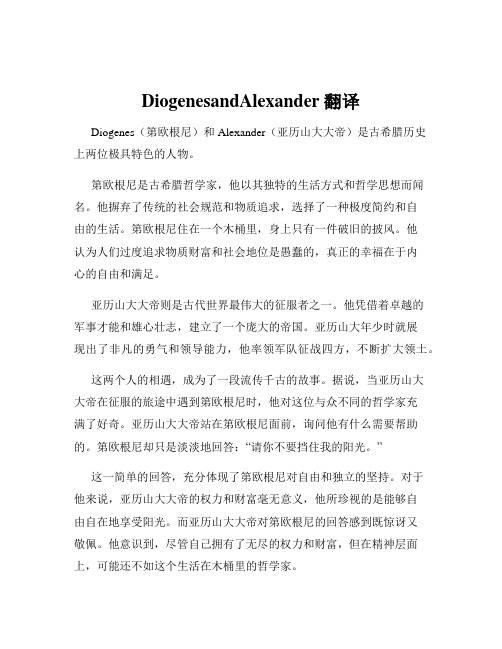
DiogenesandAlexander翻译Diogenes(第欧根尼)和 Alexander(亚历山大大帝)是古希腊历史上两位极具特色的人物。
第欧根尼是古希腊哲学家,他以其独特的生活方式和哲学思想而闻名。
他摒弃了传统的社会规范和物质追求,选择了一种极度简约和自由的生活。
第欧根尼住在一个木桶里,身上只有一件破旧的披风。
他认为人们过度追求物质财富和社会地位是愚蠢的,真正的幸福在于内心的自由和满足。
亚历山大大帝则是古代世界最伟大的征服者之一。
他凭借着卓越的军事才能和雄心壮志,建立了一个庞大的帝国。
亚历山大年少时就展现出了非凡的勇气和领导能力,他率领军队征战四方,不断扩大领土。
这两个人的相遇,成为了一段流传千古的故事。
据说,当亚历山大大帝在征服的旅途中遇到第欧根尼时,他对这位与众不同的哲学家充满了好奇。
亚历山大大帝站在第欧根尼面前,询问他有什么需要帮助的。
第欧根尼却只是淡淡地回答:“请你不要挡住我的阳光。
”这一简单的回答,充分体现了第欧根尼对自由和独立的坚持。
对于他来说,亚历山大大帝的权力和财富毫无意义,他所珍视的是能够自由自在地享受阳光。
而亚历山大大帝对第欧根尼的回答感到既惊讶又敬佩。
他意识到,尽管自己拥有了无尽的权力和财富,但在精神层面上,可能还不如这个生活在木桶里的哲学家。
第欧根尼的哲学思想对后世产生了深远的影响。
他的简约生活理念提醒着人们,不要被物质的欲望所迷惑,要追求内心的平静和真实的自我。
在当今社会,人们常常为了追求物质上的享受而忙碌奔波,忽略了内心的需求。
第欧根尼的故事让我们反思,是否我们所追求的东西真的能给我们带来幸福。
亚历山大大帝的征服之旅虽然充满了辉煌和成就,但也带来了战争的破坏和人民的苦难。
然而,从另一个角度来看,他的征服也促进了不同文化之间的交流与融合。
亚历山大大帝的帝国涵盖了众多不同的民族和文化,这种多元性在一定程度上推动了文明的发展。
第欧根尼和亚历山大大帝的对比,让我们看到了两种截然不同的价值观和生活方式。
第欧根尼与亚历山大的故事
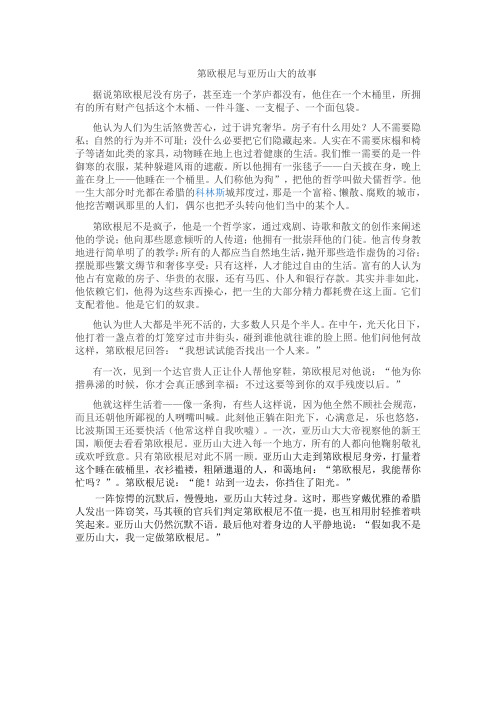
第欧根尼与亚历山大的故事据说第欧根尼没有房子,甚至连一个茅庐都没有,他住在一个木桶里,所拥有的所有财产包括这个木桶、一件斗篷、一支棍子、一个面包袋。
他认为人们为生活煞费苦心,过于讲究奢华。
房子有什么用处?人不需要隐私;自然的行为并不可耻;没什么必要把它们隐藏起来。
人实在不需要床榻和椅子等诸如此类的家具,动物睡在地上也过着健康的生活。
我们惟一需要的是一件御寒的衣服,某种躲避风雨的遮蔽。
所以他拥有一张毯子——白天披在身,晚上盖在身上——他睡在一个桶里。
人们称他为狗”,把他的哲学叫做犬儒哲学。
他一生大部分时光都在希腊的科林斯城邦度过,那是一个富裕、懒散、腐败的城市,他挖苦嘲讽那里的人们,偶尔也把矛头转向他们当中的某个人。
第欧根尼不是疯子,他是一个哲学家,通过戏剧、诗歌和散文的创作来阐述他的学说;他向那些愿意倾听的人传道;他拥有一批崇拜他的门徒。
他言传身教地进行简单明了的教学:所有的人都应当自然地生活,抛开那些造作虚伪的习俗;摆脱那些繁文缛节和奢侈享受:只有这样,人才能过自由的生活。
富有的人认为他占有宽敞的房子、华贵的衣服,还有马匹、仆人和银行存款。
其实并非如此,他依赖它们,他得为这些东西操心,把一生的大部分精力都耗费在这上面。
它们支配着他。
他是它们的奴隶。
他认为世人大都是半死不活的,大多数人只是个半人。
在中午,光天化日下,他打着一盏点着的灯笼穿过市井街头,碰到谁他就往谁的脸上照。
他们问他何故这样,第欧根尼回答:“我想试试能否找出一个人来。
”有一次,见到一个达官贵人正让仆人帮他穿鞋,第欧根尼对他说:“他为你揩鼻涕的时候,你才会真正感到幸福:不过这要等到你的双手残废以后。
”他就这样生活着——像一条狗,有些人这样说,因为他全然不顾社会规范,而且还朝他所鄙视的人咧嘴叫喊。
此刻他正躺在阳光下,心满意足,乐也悠悠,比波斯国王还要快活(他常这样自我吹嘘)。
一次,亚历山大大帝视察他的新王国,顺便去看看第欧根尼。
亚历山大进入每一个地方,所有的人都向他鞠躬敬礼或欢呼致意。
Unit_4_Diogenes_and_Alexander

e.g.
•
•
2. procure: obtain something, especially with effort or difficulty; acquire
•
> People all toil to get only those material things that are false and fleeting, but at the sacrifice of their own everlasting independence.
Main
idea of this part: Diogenes’ doctrine on house & the reason he chose to live in a cask.
Qs:
1. What are the key values he promotes? 2. What is his attitude toward wealth and power?
“Is there anything I can do for you?” --Diogenes: “Yes, stand to one side. You’re blocking the sunlight.”
Part Two Text Analysis
Plot of the story Setting of the story Protagonists of the story Theme of the story
11. He was not the first to inhabit such a thing. But he was the first who ever did so by choice, out of principle.(---3)
亚历山大和第欧根尼

亚历山大和第欧根尼有一次,亚历山大大帝来到印度。
当然,是为赢得胜利而来的。
如果你不需要赢,你哪儿也不会去。
为什么操这份心?雅典是如此美丽,没必要操心去踏上这样漫长的旅程。
在路上,他听到河岸边住着一位神秘家,第欧根尼。
他曾听说过很多关于他的故事。
在那个时代,特别是在雅典,经常说的只有两个名字。
一是亚历山大,另一就是第欧根尼。
他们是相对的,是两个极端。
亚历山大是一个皇帝,想创建一个横贯地球的王国,想拥有整个世界;他是征服者,是追求胜利的人。
而第欧根尼恰恰相反。
他赤裸着生活,什么也没有。
一开始,他有个喝水的讨饭碗,有时也讨点吃的。
然后有二天他看到一只狗从河里喝水,他立即扔掉了他的碗。
他说:「如果狗没有碗行,为什么我不行?狗好聪明,没有碗也行。
我必定很愚蠢,还随身带着这个碗、这是个负担。
」他把那条狗当成自已的师父,因为狗很聪明,他还邀请狗和他在一起。
狗使他看到他的碗是个不必要的负担--他原来没有觉知。
从那时起,狗就和他在一起。
他们常常睡在一起,一起吃东西,那狗是他唯一的伙伴。
有人问第欧根尼:「为什么你让狗作伴?」他说:「他比所谓的人更聪明。
我遇到他之前没有这么聪明。
看着他,观察他,已使我更觉知了。
他活在此时此地,什么也不使他烦心,什么财产也没有。
而他是这样幸福,什么都没有却又什么都有。
我还没有这样自在,有些不自在仍然在我里面。
当我变成就像他那样时,那我就达到了目的。
」亚历山大听说过第欧根尼,他的狂喜极乐,他的宁静;镜子般的眼晴,就像湛蓝的天空没有一片云彩。
而且这个人赤裸着生活,他甚至不需要衣服,于是有人说:「他住在河边上,我们要经过的,离他不是很远……」亚历山大想见见他,所以他去了。
这是早上,一个冬天的早上,第欧根尼正在进行日光浴,赤裸着躺在沙地上,享受着早晨,太阳照射着他,一切都是这样美丽、宁静,河流在边上流淌……亚历山大不知道说什么。
除了东西和财产,亚历山大这样的人不可能想到别的。
所以他看着第欧根尼说:「我是亚历山大大帝。
Unit-4-Diogenes-and-AlexanderPPT课件
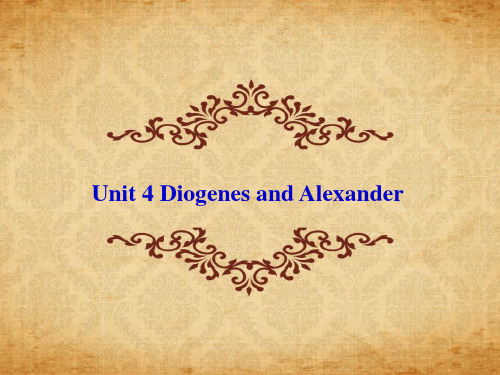
scratch v. to rub your skin with finger nails, esp. because it itches 抓,挠
Do his business like a dog.
the usage of euphemism(委婉语)
…….and washed them down with a few handfuls of water scooped from the spring. (para.1)
(Lunar Calendar vs Gregorian calendar)
Insanity was once believed to be controlled by the moon and its phases.
He was one, but not the other. (para.1)
Alexander (356-323 BC) King of Macedonia Pupil of Aristotle Military leader
欧洲历史上最伟大的四大军事 统帅之首(亚历山大大帝,汉 尼拔,恺撒大帝,拿破仑)
马其顿帝国版图
Classical Greece (500-323 BC)
A few handfuls of -ful here is used as a noun suffix. e.g. a few mouthfuls of / a spoonful of honey/a glassful of beer. scoop v. to pick something up with a scoop, spoon or your curved
Unit-4-Diogenes-and-Alexander课件
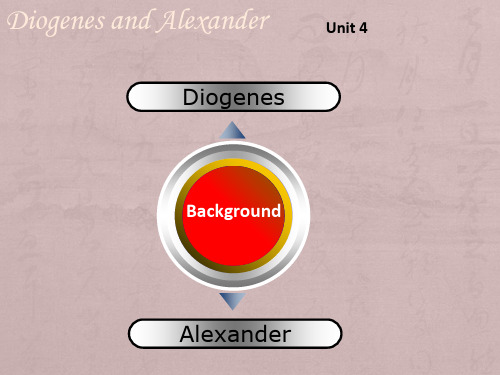
appointed him tutor to his two sons.
Text Analysis Detailed Analysis
• 3. He thought everybody lived far too elaborately, expensively, anxiously. (2)
• Paraphrase: • He thought that our life is too complicated, too costly,
Text Analysis Detailed Analysis
• 2. Sometimes they threw bits of food, and got scant thanks; sometimes a mischievous pebble, and got a shower of stones and abuse. (para. 1)
2. What does the author tell us about Alexander? What did this king have in common with Diogenes, the beggar? Why was Alexander considered a man of destiny?
at the roadside. • do one’s business: euphemism • old people: senior citizens;
Diogenes and Alexander retelling第欧根尼和亚历山大
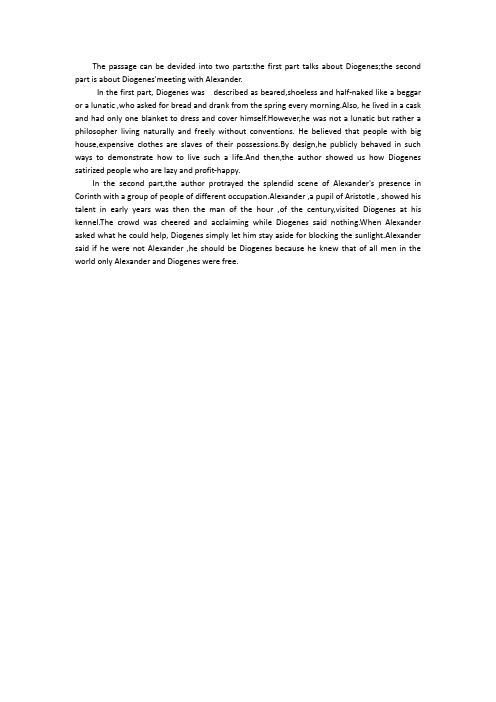
The passage can be devided into two parts:the first part talks about Diogenes;the second part is about Diogenes'meeting with Alexander.In the first part, Diogenes was described as beared,shoeless and half-naked like a beggar or a lunatic ,who asked for bread and drank from the spring every morning.Also, he lived in a cask and had only one blanket to dress and cover himself.However,he was not a lunatic but rather a philosopher living naturally and freely without conventions. He believed that people with big house,expensive clothes are slaves of their possessions.By design,he publicly behaved in such ways to demonstrate how to live such a life.And then,the author showed us how Diogenes satirized people who are lazy and profit-happy.In the second part,the author protrayed the splendid scene of Alexander's presence in Corinth with a group of people of different occupation.Alexander ,a pupil of Aristotle , showed his talent in early years was then the man of the hour ,of the century,visited Diogenes at his kennel.The crowd was cheered and acclaiming while Diogenes said nothing.When Alexander asked what he could help, Diogenes simply let him stay aside for blocking the sunlight.Alexander said if he were not Alexander ,he should be Diogenes because he knew that of all men in the world only Alexander and Diogenes were free.。
【正式版】DiogenesandAlexander第奥真尼斯和亚历山大大帝PPT资料

优选DiogenesandAlexander第奥真 尼斯和亚历山大大帝ppt
1
戴奥真尼斯
2
犬儒主义
3
亚历山大大帝
4 评论,死因,相关名言
Diogenes 戴奥真尼斯/第欧根尼
❖ Diogenes(412-324 BC) was a famous
本意是指人应当摒弃一切世俗的事物,包括宗教、礼节、惯常的衣食住行方面的习俗等一切世俗。
❖ 其主要教条是,人要摆脱世俗的利益而追求唯一值得拥有 古古代代马 马其其顿顿国国王王腓,力亚二历世山之大T子帝e。国x皇t i帝n here
Text in here
亚历山大是历史上最富有戏剧性的人物,有关他生涯的确凿事实十分富有戏剧性,有关他的名字就有许多种传说。
Text in here
beggar
Text in here
Text in here
philoso pher
Diogenes
Text in here
mission ary
CEO
Text in here
Text in here
Tet in here
Text inhere Text in here
主要思想
Text in here
Greek philosopher , 其主要教条是,人要摆脱世俗的利益而追求唯一值得拥有的善.
他认为除了自然的需要必须满足外,其他的任何东西,包括社会生活和文化生活,都是不自然的、无足轻重的。
one of the founder 东征西讨,先是确立了在全希腊的统治地位,后又灭亡了波斯帝国。
高“呼犬A“儒像 主狗 义一 ”样 (BC活y着n”ici。sCm人)们。把他他的们哲的学哲思学想叫为做
《第欧根尼与亚历山大》中的对比技巧

《第欧根尼与亚历山大》中的对比技巧第欧根尼与亚历山大下文将简称第是英国现代著名作家和评论家吉尔伯特海特的一部短箭小说,该作家通过对两个当时最伟大但同时身份地位极其悬殊的人物,即犬儒主义的代表人物第欧根尼和开启全希腊化时代的亚历山大大帝的会面,生动地诠释了犬儒主义对自由的理解。
吉尔伯特以popularizetheintellectunltopics著称,也就是说他擅长将具有浓重学术性的话晒以大众化的方式呈献给读者。
首先,作者在第一文中大量运用了对比的写作手法,将犬儒主义哲学家第欧根尼这一乞丐与叱咤风云的亚历山大大帝在诸多方面进行了对比。
如外表上,犬儒主义之所以称之为犬是其生活及行为方式给人留下的印象和狗毫无分别,文章在开头就这样描述第欧根尼的形象:他一脸络腮胡子,光着脚丫子,衣不蔽体,就那样躺在光秃秃的地上,看上去会让人觉得不是叫花子就是疯子。
而亚历山大大帝的形象却完全符合人们对一个王者的期待,给人的总体印象就是虽然年仅20岁,但看上去要比同龄人更加成熟、聪明。
第欧根尼和亚历山大

第欧根尼和亚历山大随笔1988.2吉·海特英国他躺在光溜溜的地上,赤着脚,胡子拉茬的,半裸着身子,模样活像个乞丐或疯子。
可他就是他,而不是别的什么人。
大清早,他随着初升的太阳睁开双眼,搔了搔痒,便像狗一样在路边忙开了他的公事”。
他在公共喷泉边抹了把脸,向路人讨了一块面包和几颗橄榄,然后蹲在地上大嚼起来,又掬起几捧泉水送人肚中。
他没工作在身,也无家可归,是一个逍遥自在的人。
街市上熙熙攘攘,到处是顾客、商人、奴隶、异邦人,这时他也会在其中转悠一二个钟头。
人人都认识他,或者都听说过他。
他们会问他一些尖刻的问题,而他也尖刻地回答。
有时他们丢给他一些食物,他很有节制地道一声谢;有时他们恶作剧地扔给他卵石子,他破口大骂,毫不客气地回敬。
他们拿不准他是不是疯了。
他却认定他们疯了,只是他们的疯各有各的不同;他们令他感到好笑。
此刻他正走回家去。
他没有房子,甚至连一个茅庐都没有。
他认为人们为生活煞费苦心,过于讲究奢华。
房子有什么用处?人不需要隐私;自然的行为并不可耻;我们做着同样的事情,没什么必要把它们隐藏起来。
人实在不需要床榻和椅子等诸如此类的家具,动物睡在地上也过着健康的生活。
既然大自然没有给我们穿上适当的东西。
那我们惟一需要的是一件御寒的衣服,某种躲避风雨的遮蔽。
所以他拥有一张毯子——白天披在身,晚上盖在身上——他睡在一个桶里,他的名字叫第欧根尼。
人们称他为狗”,把他的哲学叫做犬儒哲学。
他一生大部分时光都在希腊的克林斯城邦度过,那是一个富裕、懒散、腐败的城市,他挖苦嘲讽那里的人们,偶尔也把矛头转向他们当中的某个人。
他的住所不是木材做成的,而是泥土做的贮物桶。
这是一个破桶,显然是人们弃之不用的。
住这样的地方他并不是第一个,但他确实是第一个自愿这么做的人,这出乎众人的想法。
第欧根尼不是疯子,他是一个哲学家,通过戏剧、诗歌和散文的创作来阐述他的学说;他向那些愿意倾听的人传道;他拥有一批崇拜他的门徒。
他言传身教地进行简单明了的教学。
diogenes and alexander 文章赏析

diogenes and alexander 文章赏析摘要:1.迪奥根尼斯与亚历山大故事的背景介绍2.迪奥根尼斯的人生哲学及其体现3.亚历山大与迪奥根尼斯的相遇及对话4.故事中所传达的人生哲理5.对现代人的启示正文:一、迪奥根尼斯与亚历山大故事的背景介绍迪奥根尼斯(Diogenes)是一位古希腊哲学家,他是犬儒学派(Cynic)的创立者,生活在公元前400年至公元前320年。
犬儒学派强调简朴、自制和自然的生活态度。
亚历山大(Alexander)则是古希腊的一位伟大征服者,他在公元前4世纪统一了希腊世界,并将其影响力扩展到亚洲和埃及等地。
二、迪奥根尼斯的人生哲学及其体现迪奥根尼斯主张人应当摆脱物质束缚,追求心灵的自由。
他认为,幸福并不取决于财富、地位等外在因素,而是取决于内心的智慧和觉悟。
为了体现这一观念,他选择过上简朴的生活,住在木桶里,穿着破烂的衣服,以乞讨为生。
他主张自给自足,不受世俗观念的约束,追求内心的自由与宁静。
三、亚历山大与迪奥根尼斯的相遇及对话有一次,亚历山大遇到迪奥根尼斯,他被迪奥根尼斯的生活态度所吸引,于是上前与他交谈。
亚历山大问迪奥根尼斯:“你有什么需要我帮助的吗?”迪奥根尼斯回答:“是的,请你让开,不要挡住我的阳光。
”这句回答令亚历山大深感敬佩,他认为迪奥根尼斯是一个勇敢、独立的人,尊敬地称他为“伟大的犬儒主义者”。
四、故事中所传达的人生哲理这个故事传达了以下人生哲理:1.内心自由比外在地位更重要;2.简朴生活有助于提升心灵的境界;3.勇敢面对困境,保持独立的人格;4.尊重他人,尤其是那些追求内心自由的人。
五、对现代人的启示迪奥根尼斯与亚历山大的故事给现代人带来以下启示:1.不要过分追求物质财富,重视心灵的成长;2.学会珍惜简单、平凡的生活;3.勇敢地追求自己的梦想,不受世俗观念的束缚;4.尊重他人的选择,包容不同的价值观。
通过这个故事,我们可以认识到,无论时代如何变迁,人生的本质需求并未改变。
Unit 4 Diogenes and Alexander_word study
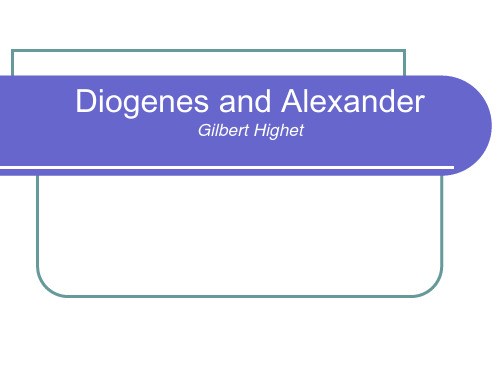
About the Text
Word
comparison
smile: an expression on your face in which your mouth curves upwards to show that you are happy, amused, friendly,etc. grin: a wide smile laugh: to make the sounds and movements of the face that people make when they think sth is funny guffaw: a noisy, loud laugh titter: to laugh quietly, esp when you are nervous giggle: a quiet, repeated laugh
Word
comparison
•
Compare: notice the subtle difference between the following synonyms. habit: (picking one’s nose; biting one’s nails; smoking; getting up early) custom: (using chopsticks; wearing black in mourning; express love with a kiss,etc) tradition: (respecting the old; cherishing the family; eating turkey on Thanksgiving; loving peace; always ready to help others) convention: (married women taking their husbands’ names; shaking hands when you meet with friends; marrying within your own religion, etc)
精读第四课Diogenes-and-Alexander背景知识课件
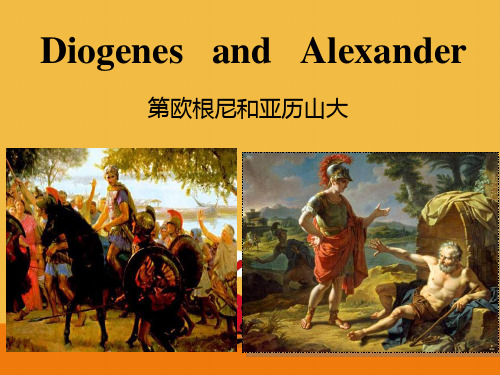
Plato
Aristotle
Aristotle(384 BC – 322 BC)was a Greek philosopher and polymath(博学的人), a student of Plato and teacher of Alexander the Great. His writings cover many subjects, including physics, metaphysics(形而上学), poetry, theater, music, logic, rhetoric(修辞学), linguistics(语言学), politics, government, ethics( 伦理学), biology, and zoology. Together with Plato and Socrates (Plato's teacher), Aristotle is one of the most important founding figures in Western philosophy. Aristotle's writings were the first to create a comprehensive system of Western philosophy, encompassing ethics, aesthetics, logic, science, politics, and metaphysics.
第 欧 根 尼
Plato(428/427 BC[a] – 348/347 BC) was a philosopher in Classical Greece. He was also a mathematician, student of Socrates(苏格拉底), and founder of the Academy in Athens, the first institution of higher learning in the Western world. Along with his mentor, Socrates, and his student, Aristotle, Plato helped to lay the foundations of Western philosophy and science.
Unit 4 Diogenes and Alexander
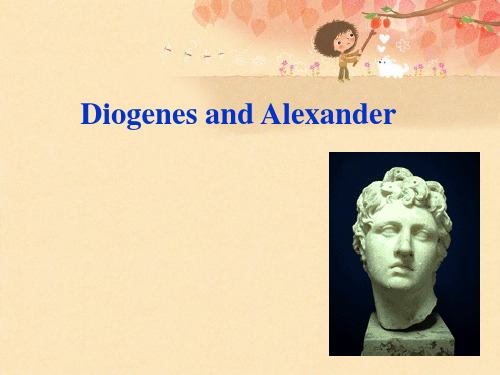
Alexander the Great
Alexander the Great was (born on July 20, 356 B.C., in Pella,)king of Macedonia. During his leadership, from 336 to 323 B.C., he united the Greek city-states and led the Corinthian League. He also became the king of Persia(波斯), Babylon(巴比伦) and Asia, and created Macedonian colonies in Iran. While considering the conquests of Carthage and Rome, Alexander died of malaria in Babylon, Persia (now Iran), on June 13, 323 B.C
第 欧 根 尼
Plato
Plato(428/427 BC[a] – 348/347 BC) was a philosopher in Classical Greece. He was also a mathematician, student of Socrates(苏格拉底), and founder of the Academy in Athens, the first institution of higher learning in the Western world. Along with his mentor, Socrates, and his student, Aristotle, Plato helped to lay the foundations of Western philosophy and science.
现代大学英语3-Unit-4-Diogenes-and-Alexander-词汇精讲
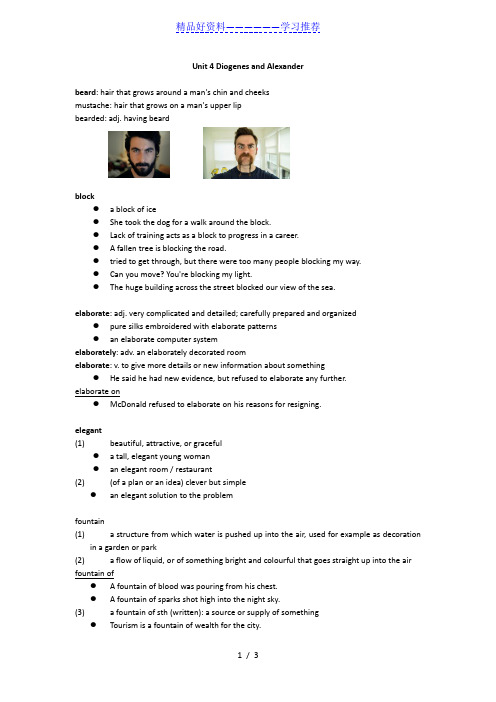
Unit 4 Diogenes and Alexanderbeard: hair that grows around a man's chin and cheeksmustache: hair that grows on a man's upper lipbearded: adj. having beardblock● a block of ice●She took the dog for a walk around the block.●Lack of training acts as a block to progress in a career.● A fallen tree is blocking the road.●tried to get through, but there were too many people blocking my way.●Can you move? You're blocking my light.●The huge building across the street blocked our view of the sea.elaborate: adj. very complicated and detailed; carefully prepared and organized●pure silks embroidered with elaborate patterns●an elaborate computer systemelaborately: adv. an elaborately decorated roomelaborate: v. to give more details or new information about something●He said he had new evidence, but refused to elaborate any further.elaborate on●McDonald refused to elaborate on his reasons for resigning.elegant(1)beautiful, attractive, or graceful● a tall, elegant young woman●an elegant room / restaurant(2)(of a plan or an idea) clever but simple●an elegant solution to the problemfountain(1) a structure from which water is pushed up into the air, used for example as decorationin a garden or park(2) a flow of liquid, or of something bright and colourful that goes straight up into the air fountain of● A fountain of blood was pouring from his chest.● A fountain of sparks shot high into the night sky.(3) a fountain of sth (written): a source or supply of something●Tourism is a fountain of wealth for the city.guffaw: to laugh loudlyother words to describe “laugh”half-nakedhalf-bloodedhalf-brother/sisterhalf-breedhalf-heartedlunatic: n. someone who behaves in a crazy or very stupid way; adj. extreme or dangerousmonarch: n. a king or queenmonarchy: the system in which a country is ruled by a king or queen; a country that is ruled by a king or queen●constitutional monarchy systemmonarchic/monarchical adj.●the old monarchical systemnudge(1)to push sb gently, especially with your elbow, in order to get their attention●H e nudged me and whispered, “Look who's just come in.”(2)to move forward slowly by pushing gentlynudge your way to/through etc (sth)●I started to nudge my way to the front of the crowd.oliveolive tree/groveolive oilolive greenolivebrancholive skin/complexionprivate n./adj.I need to speak to you in private.Saving Private Ryanprivate enterpriseprivate jokeprivate detective/eyeprivacy: n.scant: very little or not enoughscant regard: Peter had shown scant regard for her feelings.scant attention: Jen paid scant attention to their conversation.scoop/ladle/dipper/spoon (the Big Dipper)scratchHe was scratching at the bites on his arm.Don't worry; the cat won't scratch you.This crisis has politicians scratching their heads and wondering what to do.He had built the business up from scratch.squat v.(1)to sit with your knees bent under you and your bottom just off the ground, balancingon your feet●He squatted down beside the little girl.(2)to live in a building or on a piece of land without permission and without paying rent n.(1) a squatting position of the body(2) a building that people are living in without permission and without paying rent: to live in a squatsquatter n.stroll v./n. to walk somewhere in a slow relaxed way●She strolled over to join them.●Let's go for a stroll.Sweat v.(1)to have drops of salty liquid coming out through your skin because you are hot, ill,frightened, or doing exerciseI was sweating a lot despite the air-conditioning.Within minutes she was sweating profusely /heavily.He was sweating buckets (= a lot).(2)to work very hardThey sweated and saved for ten years to buy a house.I sweated blood to get that report finished.。
unit4 Diogenes and Alexander

Cynicism
--------cynicism
--------The development of Cynicism 安提西尼
---------The development of Cynicism 戴奥真尼斯
Alexander
-------information of Alexander -------influence of Alexander
Cynicism
cynicism,
in its original form, refers to the beliefs of an ancient school of Greek philosophers known as the Cynics. Their philosophy was that the purpose of life was to live a life of Virtue in agreement with Nature. This meant rejecting all conventional desires for wealth, power, health, and fame, and by living a simple life free from all possessions. As reasoning creatures, people could gain happiness by rigorous training and by living in a way which was natural for humans. They believed that the world belonged equally to everyone, and that suffering was caused by false judgments of what was valuable and by the worthless customs and conventions which surrounded society. Many of these thoughts were later absorbed into Stoicism斯多葛 哲学 .
Unit4DiogenesandAlexander教学教案讲义
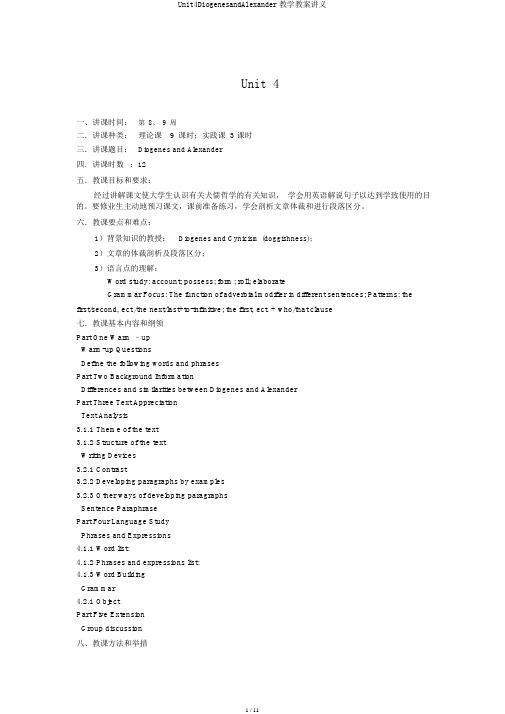
Unit 4一、讲课时间:第8、9周二.讲课种类:理论课9课时;实践课 3 课时三.讲课题目:Diogenes and Alexander四.讲课时数:12五.教课目标和要求:经过讲解课文使大学生认识有关犬儒哲学的有关知识,学会用英语解说句子以达到学致使用的目的。
要修业生主动地预习课文,课前准备练习,学会剖析文章体裁和进行段落区分。
六.教课要点和难点:1)背景知识的教授:Diogenes and Cynicism (doggishness);2)文章的体裁剖析及段落区分;3)语言点的理解:Word study: account; possess; form; roll; elaborateGrammar Focus: The function of adverbial modifier in different sentences; Patterns: the first/second, ect./the next/last+to-infinitive; the first, ect. + who/that clause七.教课基本内容和纲领Part One Warm –upWarm-up QuestionsDefine the following words and phrasesPart Two Background InformationDifferences and similarities between Diogenes and AlexanderPart Three Text AppreciationText Analysis3.1.1 Theme of the text3.1.2 Structure of the textWriting Devices3.2.1 Contrast3.2.2 Developing paragraphs by examples3.2.3 Other ways of developing paragraphsSentence ParaphrasePart Four Language StudyPhrases and Expressions4.1.1 Word list:4.1.2 Phrases and expressions list:4.1.3 Word BuildingGrammar4.2.1 ObjectPart Five ExtensionGroup discussion八、教课方法和举措本单元将运用黑板、粉笔、多媒体网络协助教课设施等教课手段,主要采纳以学生为主体、教师为主导的任务型、合作型等教课模式,详细运用教师讲解法、师生议论、生生议论等方法进行教课。
- 1、下载文档前请自行甄别文档内容的完整性,平台不提供额外的编辑、内容补充、找答案等附加服务。
- 2、"仅部分预览"的文档,不可在线预览部分如存在完整性等问题,可反馈申请退款(可完整预览的文档不适用该条件!)。
- 3、如文档侵犯您的权益,请联系客服反馈,我们会尽快为您处理(人工客服工作时间:9:00-18:30)。
第欧根尼.亚历山大
吉尔伯特.海特
1 他躺在光秃禿的地上,光着脚,留着长须,半裸着身体,看上去像个乞丐或是疯子。
他是一个乞丐,但却不是一个疯子。
他在日出时醒来,抓抓痒,像狗样在路边方便,在公共喷泉里洗把脸,然后讨一片面包和几颗橄榄当早餐,蹲在地上吃了,再用手捧几捧泉水把东西都送进肚里。
(很久以前他有一个粗糙的木头杯子,但当他看到一个男孩用双手捧水喝的时候就把他扔掉了。
)由于他不用工作,也不用养家糊口,所以他是自由的。
等到集市上逐渐挤满了购物者、商人、奴隶和外国人时,他已经在这里来回游荡—两个小时了。
这里人人都认识他,或者听说过他。
他们会问他一些尖锐的问题,得到的是更为尖锐的回答。
有时他们会扔给他一些食物,但他很少表示感谢。
有时也有人恶作剧地向他扔石子,他则会报之以雨点般的石头和辱骂。
他们不知道他是否疯了。
但他知道这些人都是疯子,各种各样的疯子,这些人叫他感到可笑。
现在他回到家了。
2 他的家不是什么房屋,甚至都算不上是临时占用或建造的简陋小窝棚。
他觉得每个人都生活得太复杂、太豪华、太烦心了。
要房子做什么?没有人需要什么隐私,自然的生理行为并不可耻,我们都做同样的事情,根本不需要遮遮掩掩。
谁也用不着床、椅子这一类的家具;动物们睡在地上都照样很健康。
我们所需要的就是一件衣服,用来保暖,因为大自然没有给我们适当着装:还有就是能挡挡风雨的栖身处。
所以他有一条毯子---白天当衣服穿,晚上当被子盖。
他睡在一个大桶里。
他的名字叫第欧根尼。
他是人们称之为“犬懦主义”哲学的创始人。
他一生中大部分时间都生活在富饶、懒散、堕落的希腊城市科林斯,嘲笑、讥讽城里的人,偶然说服某个人皈依他的信仰。
3 他不是住在木桶里,那太昂贵了。
他的家是一个陶土做的贮物桶,显然是别人丢掉的,因为那桶破了,毫无用处了。
他不是第一个住这种“房子”的人。
但他是第一个出于原则,自己选择这么做的人。
4 第欧根尼不是疯子。
他是一位哲学家,写过剧本、诗歌和文章来阐述自己的理论;他与乐意听他讲话的人交谈;他有钦佩他的学生,但他主要是通过身体力行,亲身实践来讲授他的理论. 他说所有人都应当自然地生活,因为一切自然的东西都是正常的,不可能是邪恶或者可耻的,生活不该拘泥于刻板的社会习俗,因为那些东西是人造的、虚假的;人们应该摆脱复杂和奢华的一切,只有如此才能过上自由的生活。
富豪以为他拥有一座有很多房间、很多高级家具的大厦,拥有昂贵的华服、马匹、仆人和银行存折。
但他并不是拥有这些东西,而是依赖它们,为它们担惊受怕,并用毕生的精力照料它们。
他害怕会丢失这些东西,这个念头让他坐立不安。
这些东西控制了他。
他是它们的奴隶。
为了获得这些虚妄的、很快就会消失的东西,他出卖了他唯一真实的、持久的无价之宝:他的独立与自由。
5 世上有许多人因为厌倦了人世间的复杂,而选择避世,到小农场、小村庄
里过简单的生活,或是隐居于山洞内,但第欧根尼不是这样的人。
他是一位使者。
他有着淸晰的生活目标:“改变钱币上所印的价值,他要把印在人类生命这块干净的金属上的陈旧虚假的传统价值符号都擦去,然后印上生命真正的价值。
6 其他公元前4世纪的伟大哲学家,如柏拉图和亚里士多徳,主要是教授自己门下的学生。
但对第欧根尼而言,教学所需的实验室、标本、讲堂和学生就在普通人群当中。
所以他选择居住在雅典或者科林斯,因为那里有来来往往的,来自地中海周边各处的旅行者。
而且他故意在公众场合这般举止,以此告诉人们什么是真正的生活。
7 他认为多数人都是半生半死,大多数人只算得上半个人。
在阳光灿烂的正午,他提着一盏明灯从集市穿过,端详遇到的每个人的面孔。
人们问他为何要这么做。
他回答说,“我在寻找一个真正的人。
”
8 看到一个仆人为他的主人穿鞋子,第欧根尼说,“你非要他为你擦鼻子,你才会真正高兴,等你双手没用时,那一天就到了。
”
9有一次,有风声说一场战争即将爆发,这消息惊动了懒情成性、一心捞钱的科林斯人,他们开始军亊操练,擦亮武器,重建他们荒废已久的防御工事。
第欧根尼拿起他栖身的破桶,来回滚动。
在你们如此忙碌的时候,”他说,“我感觉我也应该做点亊情!”
10第欧根尼就这样生活---有人说,就像一条狗,因为他毫不在意社会的各种规矩和习俗,也因为他常常向他讨厌的人露出牙齿、像狗一样大声吼叫。
现在他满足并快乐地躺在阳光下,甚至比波斯国王(他常常这样吹嘘说)还要开心。
尽管他知道一位重要人物要来访问他,他也不肯动一动身。
11小广场上渐渐挤满了人,那些书童、武士、秘书、军官和外交官们渐渐在第欧根尼身边围成一个圈。
他一个个望了望他们,仿佛一个清醒的人看着一帮蹒跚的醉鬼,摇了摇头。
他知道这些人是谁。
他们是亚历山大的仆人---这个征服了希腊的马其顿国王正在巡视他的新領地。
12虽然只有20岁,亚历山大看起来比他的实际年龄要成熟、睿智得多。
像所有马其顿人一样,他喜欢暍酒,但他能把握好自己;对待女人,他一副骑士气度,彬彬有礼,十分克制;像所有马其顿人一样,他喜欢打仗:他是一位极为英明的指挥官,但他不仅仅是一个打仗机器,他能够思考。
他13岁时就成为希猎最伟大的思想家亚里士多德的学生,从他那里学到了希腊文化的精髓。
亚里士多德教他诗歌,而这位年轻的王子睡觉的时候都将伊利亚特放在枕头下,梦想着有朝一日能超越那个把亚洲强国变成一片废墟的阿喀琉斯。
亚里士多德也教他哲学,尤其是政洽权力的形态和用途,还教他科学研究的原理。
亚历山大攻打波斯时带去了一大批科学家,并将几百种动物标本运回希腊,用以做研究。
的确,正是从亚里士多德那里,他学会了如何找到一切可能会有价值的新亊物。
13现在,亚历山大来到了科林斯,来接管他父亲菲利普创建的希腊域邦,在这里,他受到人们的欢迎、尊重和奉承。
他是此时此刻、甚至这个世纪最伟大
的人,他被一致推举为讨伐古老、富饶又奢靡的亚洲的一支新远征军的最高统帅。
几乎所有人都涌到科林斯来祝货他,或是指望得到一官半职,或是甚至就为了见他一面。
只有第欧根尼没有前去拜访这位新即位的君主,尽管他就住在科林斯。
于是,出于亚里士多德教给他的宽宏大量,亚历山大决定亲自拜访第欧根尼。
14亚历山大穿着紫色与金色相间的斗篷,他面貌英俊、目光锐利、身强力壮,浑身散发出决定未来的气势。
人群中让出一条路来,他慢慢向这位犬儒派哲学家的狗窝走去。
通常当君主走近时,所有人都会起身表示敬意。
但第欧根尼只是支起胳膊斜躺者,当一个国王走进某个地方时,人们都要对他鞠躬或是欢呼。
第欧根尼却一言不发。
15人群安静片刻,亚历山大首先打破了沉默。
和蔼地向第欧根尼问好,他看看那个破旧的木桶,那件破烂的单衣,和那个躺在地上样貌粗鲁的人,问道,“我能为你做些什么你,第欧根尼?”
16“是的, ”这位犬儒主义哲学家说,"请你靠边站。
你档住我的阳光了。
”
17人们十分吃惊,一时鸦雀无声。
亚历山大慢慢转过身去,这时,在那些高雅的希腊人中发出了窃笑声。
那些马其顿的军官们想了想,认为不值得为此去踢第欧根尼,也开始互相用手肘轻推着呵呵笑了起来。
亚历山大仍然不语,过了一会儿,他对身边的人悄声说,“如果我不不是亚历山大,我就要成为第欧根尼。
”他们觉得这是一个矛盾的说法。
但亚历山大却真的是这样认为。
别人不理解犬儒主义,但是他理解。
第欧根尼称自己为“世界公民”,亚历山大认为他自己也是,就如第欧根尼一样,亚历山大也敬仰英雄赫拉克勒斯,因为他是为造福全人类而不辞辛劳,其他人却只是为自己吃苦流汗。
亚历山大明白,世上所有活着的人当中,只有他这位征服者,第欧根尼这个乞丐是真正自由的。
